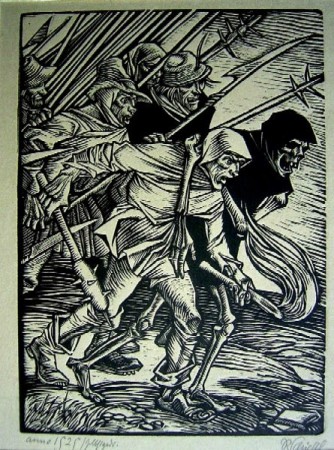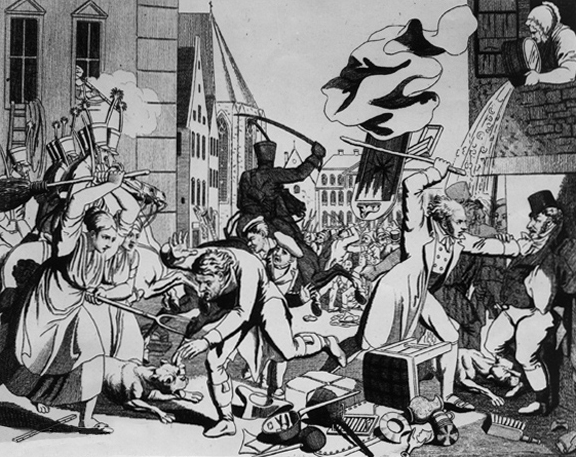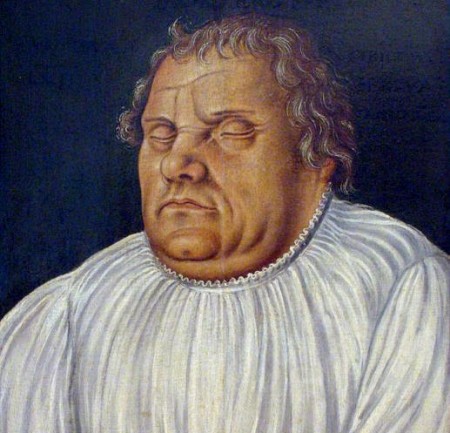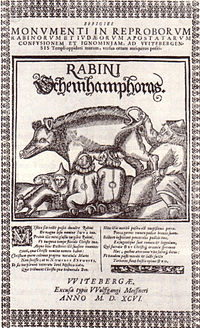https://shamelesspopery.com/the-dark-side-of-martin-luther/
The Dark Side of Martin Luther
by Joe HeschmeyerYesterday was Martin Luther’s 531st birthday, and today is the Feast Day of St. Martin. It seems like a fitting time to give an honest assessment of some of the darker parts of Luther’s legacy, and consider their implications.
There’s a popular Luther narrative that plays out a little like Star Wars. A humble son of the Church rises up to overthrow the Dark Side, the Evil Empire, the Roman Catholic Church, all while cominfg to see his true identity. We love an underdog story, so it’s easy to root for Luther. And this narrative is an important one, both for Protestants (to show why the Reformation was “necessary”) and atheists (to show why Catholicism/Christianity/fundamentalism/religion is dangerous and evil).
But no matter how attractive it may be, this Luther narrative is a fundamentally false one. It relies on two sets of falsehoods: (1) distortions and exaggerations of the evils done on the Catholic side; and (2) a whitewashing of the real history of Luther and the early Protestants. I’ve addressed (1) before, and I’d like to address (2) head-on today.
The real-life Luther was a man passionately convicted of his own rightness, so convinced that he thought anyone who disagreed with him was either ignorant, stupid, or evil. It was this overconfidence that I would suggest is the root behind some of the shockingly evil things he advocated. I’m going to lay them out here, letting them speak for themselves, before considering the implications of these facts.
A few years after Luther’s break from the Catholic Church, the revolutionary momentum that he had helped to unleash culminated in a massive popular (and bloody) uprising called the German Peasants’ War. I’ll let James Stayer, a historian of the German Reformation, paint the scene:
 |
| Rudolf Schiestl, Peasant Warrior and Death, 1525 (20th c.) |
When the Roman court stumbled into condemning Luther in 1520, many of the younger generation of German-speaking theologians and biblical scholars turned against it [Rome / the papacy]. Certainly there were elements here of German cultural rebellion against the Latinate clerical caste that had dominated northern Europe throughout the Middle Ages. […] Now the revolt of German against Latin merged with a revolt of the commonrs against the clergy and aristocracy. Such a revolt was climaxed in wide areas of South Germany by the German Peasants’ War of 1525-26. This so-called war united the unprivileged in towns and rural districts, and it was the high-water mark of the Reformation as a spontaneous popular movement.
Having accidentally sparked a bloody revolution, Luther was in an unpleasant position. He was quickly associated with the revolutionary peasants both by the peasants themselves (to expand their popularity) and by his Catholic opponents (to show the danger of his ideas). This lead him to respond to the revolution in two very different ways.
Luther’s initial response was to criticize both sides of the feud in his Admonition to Peace. To the Christian princes and lords, he wrote:
We have no one on earth to thank for this disastrous rebellion, except you princes and lords, and especially you blind bishops and mad priests and monks, whose hearts are hardened, even to the present day. You do not cease to rant and rave against the holy gospel; even though you know that it is true and that you cannot refute it. In addition, as temporal rulers you do nothing but cheat and rob the people so that you may lead a life of luxury and extravagance. The poor common people cannot bear it any longer. The sword is already at your throats, but you think that you sit so firm in the saddle that no one can unhorse you. This false security and stubborn perversity will break your necks, as you will discover.
(As an aside, notice how Luther is convinced that his opponents know that he is right, and just refuse to accept it: it can’t be an honest difference of opinion or Biblical interpretation.)
But Luther also addressed the revolting peasants, admitting the validity of some of their arguments, but calling them to moderation:
Nevertheless, you, too, must be careful that you take up your cause justly and with a good conscience. If you have a good conscience, you have the comforting advantage that God will be with you, and will help you. Even though you did not succeed for a while, or even suffered death, you would win in the end, and you would preserve your souls eternally with all the saints. But if you act unjustly and have a bad conscience, you will be defeated. And even though you might win for a while and even kill all the princes, you would suffer the eternal loss of your body and soul in the end.
Luther’s Admonition to Peace was published in early 1525. Shortly after this, Luther toured the war-torn area, seeing both the severity of the peasants’ actions, and the ineffectiveness of his own preaching. His admonition to peace having failed, Luther’s new position can fairly be characterized as an admonition to massacre.
In May of 1525, he published a work originally titled Against the Rioting Peasants, the title of which was quickly changed to Against the Murderous, Thieving Hordes of Peasants, in which he called on everyone to kill the peasants, en masse:
Besides, any man against whom it can be proved that he is a maker of sedition is outside the law of God and Empire, so that the first who can slay him is doing right and well. For if a man is an open rebel every man is his judge and executioner, just as when a fire starts, the first to put it out is the best man. For rebellion is not simple murder, but is like a great fire, which attacks and lays waste a whole land. Thus rebellion brings with it a land full of murder and bloodshed, makes widows and orphans, and turns everything upside down, like the greatest disaster. Therefore let everyone who can, smite, slay and stab, secretly or openly, remembering that nothing can be more poisonous, hurtful or devilish than a rebel. It is just as when one must kill a mad dog; if you do not strike him, he will strike you, and a whole land with you.
His new message was to offer the prospect of martyrdom to those fighting for the aristocracy, but only hellfire for all the slain peasants:
Thus it may be that one who is killed fighting on the ruler’s side may be a true martyr in the eyes of God, if he fights with such a conscience as I have just described, for he is in God’s Word and is obedient to him. On the other hand, one who perishes on the peasants’ side is an eternal brand of hell, for he bears the sword against God’s Word and is disobedient to him, and is a member of the devil. […] Strange times, these, when a prince can win heaven with bloodshed, better than other men with prayer!
As Dr. Mark U. Edwards, Jr. notes, “Luther had his way” and the “peasants were brutally suppressed.” Estimates of those slaughtered range from 100,000 to 300,000.
Another major problem in the world of Martin Luther was widespread Catholic suspicion and hatred of the Jews. This was a problem that Luther could hardly be ignorant of: his own church in Wittenberg had a Judensau: on the outside of the church, there was (and still is) an obscene carving of a group of Jews and pigs suckling at the teat of a pig, while a rabbi looks under the pig’s tail.
In 1523, Luther published That Jesus Christ Was Born a Jew, an eloquent denunciation of anti-Judaism. Luther lambasted the Catholic Jew-haters who he accused of both treating the Jews in a subhuman manner, and in driving them from the Gospel:
The Judensau at Wittenberg. Our fools, the popes, bishops, sophists, and monks-the crude asses’ heads-have hitherto so treated the Jews that anyone who wished to be a good Christian would almost have had to become a Jew. If I had been a Jew and had seen such dolts and blockheads govern and teach the Christian faith, I would sooner have become a hog than a Christian.
They have dealt with the Jews as if they were dogs rather than human beings; they have done little else than deride them and seize their property. When they baptize them they show them nothing of Christian doctrine or life, but only subject them to popishness and monkery. When the Jews then see that Judaism has such strong support in Scripture, and that Christianity has become a mere babble without reliance on Scripture, how can they possibly compose themselves and become right good Christians? I have myself heard from pious baptized Jews that if they had not in our day heard the gospel they would have remained Jews under the cloak of Christianity for the rest of their days. For they acknowledge that they have never yet heard anything about Christ from those who baptized and taught them.
I hope that if one deals in a kindly way with the Jews and instructs them carefully from Holy Scripture, many of them will become genuine Christians and turn again to the faith of their fathers, the prophets and patriarchs. They will only be frightened further away from it if their Judaism is so utterly rejected that nothing is allowed to remain, and they are treated only with arrogance and scorn. If the apostles, who also were Jews, had dealt with us Gentiles as we Gentiles deal with the Jews, there would never have been a Christian among the Gentiles. Since they dealt with us Gentiles in such brotherly fashion, we in our turn ought to treat the Jews in a brotherly manner in order that we might convert some of them. For even we ourselves are not yet all very far along, not to speak of having arrived.
I suspect that most people today would agree with Luther completely on these points: treating the Jews in such a vile way was both unchristian and counter-productive (at least, if one is actually concerned about their eternal salvation). As the Reformation was still young at this point, Luther is also visibly hopeful at the prospect that the Jews will respond positively to his reformulation of the Gospel.
As with the German peasants, Luther was quickly disappointed. The Jews didn’t en masse convert to Lutheranism. So Luther turned against them, becoming increasingly antagonistic towards the Jews throughout his life. One of the last works Luther ever wrote was his 1543 book On the Jews and Their Lies, published just three years before his dead. The book is chock full of the standard anti-Semitic conspiracy theories and black legends about all the evil things the Jews allegedly do when Christians aren’t around. This leads Luther, in Chapter 11 of the book, to present his Jewish problem:
What shall we Christians do with this rejected and condemned people, the Jews? Since they live among us, we dare not tolerate their conduct, now that we are aware of their lying and reviling and blaspheming. If we do, we become sharers in their lies, cursing and blasphemy. Thus we cannot extinguish the unquenchable fire of divine wrath, of which the prophets speak, nor can we convert the Jews.
Luther offered a seven-fold solution to his Jewish problem:
 |
| Johann Michael Voltz, Hep-Hep Riots (1819) |
- “First, to set fire to their synagogues or schools and to bury and cover with dirt whatever will not burn, so that no man will ever again see a stone or cinder of them. This is to be done in honor of our Lord and of Christendom, so that God might see that we are Christians, and do not condone or knowingly tolerate such public lying, cursing, and blaspheming of his Son and of his Christians.”
- “Second, I advise that their houses also be razed and destroyed. For they pursue in them the same aims as in their synagogues. Instead they might be lodged under a roof or in a barn, like the gypsies. This will bring home to them the fact that they are not masters in our country, as they boast, but that they are living in exile and in captivity, as they incessantly wail and lament about us before God.”
- “Third, I advise that all their prayer books and Talmudic writings, in which such idolatry, lies, cursing, and blasphemy are taught, be taken from them.”
- “Fourth, I advise that their rabbis be forbidden to teach henceforth on pain of loss of life and limb.”
- “Fifth, I advise that safe-conduct on the highways be abolished completely for the Jews. For they have no business in the countryside, since they are not lords, officials, tradesmen, or the like. Let them stay at home.”
- “Sixth, I advise that usury be prohibited to them, and that all cash and treasure of silver and gold be taken from them and put aside for safekeeping. The reason for such a measure is that, as said above, they have no other means of earning a livelihood than usury, and by it they have stolen and robbed from us an they possess. […] Whenever a Jew is sincerely converted, he should be handed one hundred, two hundred, or three hundred florins, as personal circumstances may suggest. With this he could set himself up in some occupation for the support of his poor wife and children, and the maintenance of the old or feeble.”
- “Seventh, I recommend putting a flail, an ax, a hoe, a spade, a distaff, or a spindle into the hands of young, strong Jews and Jewesses and letting them earn their bread in the sweat of their brow, as was imposed on the children of Adam (Gen. 3 [:19]). For it is not fitting that they should let us accursed Goyim toil in the sweat of our faces while they, the holy people, idle away their time behind the stove, feasting and farting., and on top of all, boasting blasphemously of their lordship over the Christians by means of our sweat. No, one should toss out these lazy rogues by the seat of their pants.”
In other words, burn down all the synagogues, burn down the houses of the Jews, deprive the Jews of their employment (and take all their money for “safekeeping”), and kill their rabbis and any Jews who leave home. Since the Jews weren’t going to simply stop practicing their religion, Luther’s proposal would require murdering an endless series of rabbis and their successors.
Synagoge of Siegen, Germany, burning during Kristallnacht in Nazi Germany (November 9, 1938) It is difficult to understand the behavior of most German Protestants in the first Nazi years unless one is aware of two things: their history and the influence of Martin Luther. The great founder of Protestantism was both a passionate anti-Semite and a ferocious believer in absolute obedience to political authority. He wanted Germany rid of the Jew and when they were sent away he advised that they be deprived of “all their cash and jewels and silver and gold” and furthermore, “that their synagogues or schools be set on fire, that their houses be broken up and destroyed… and they be put under a roof or stable, like the gypsies… in misery and captivity as they incessantly lament and complain to God about us” – advice that was literally followed four centuries later by Hitler, Goering and Himmler.
In what was perhaps the only popular revolt in German history, the peasant uprising of 1525, Luther advised the princes to adopt the most ruthless measures against the “mad dogs,” as he called the desperate, downtrodden peasants. Here, as in his utterances about the Jews, Luther employed a coarseness and brutality of language unequaled in German history until the Nazi time. The influence of this towering figure extended down the generations in Germany, especially among the Protestants. Among other results was the ease with which German Protestantism became the instrument of royal and princely absolutism from the sixteenth century until the kings and princes were overthrown in 1918. The hereditary monarchs and petty rulers became the supreme bishops of the Protestant Church in their lands. Thus in Prussia the Hohenzollern King was the head of the Church. In no country with the exception of Czarist Russia did the clergy become by tradition so completely servile to the political authority of the State. Its members, with few exceptions, stood solidly behind the King, the Junkers and the Army, and during the nineteenth century they dutifully opposed the rising liberal and democratic movements. Even the Weimar Republic was anathema to most Protestant pastors, not only because it had deposed the kings and princes but because it drew its main support from the Catholics and the Socialists. During the Reichstag elections one could not help but notice that the Protestant clergy – Niemoeller was typical – quite openly supported the Nationalist and even the Nazi enemies of the Republic. Like Niemoller, most of the pastors welcomed the advent of Adolf Hitler to the chancellorship in 1933.
The idea that the Nazis were initially successful because of the groundwork that Luther laid is an intriguing hypothesis, and Shirer presents several strong arguments for it. But it’s worth noting in Luther’s defense that the situation is more complex than this. First, Luther hated Jews on account of their religion, rather than their race: he was willing to let the Jews live off of a tiny allowance if they would sincerely convert to Christianity. Hitler’s opposition to the Jews was based more on racial lines, and so even a great many Hebrew Christians died in the Holocaust. Second, as alluded to above, anti-Judaism predates Luther. That said, it is undeniable that Luther recognized the dangers of this hatred of the Jews, and yet fueled the fires nonetheless.
The question of how much Luther is to blame for the Holocaust is an intriguing one, but I want to go a few different directions, instead.
I mentioned before that Luther was so passionately convinced of his own rightness that he thought his opponents must necessarily be ignorant, stupid, or evil. This is the spirit consistently animating Luther’s writings. When he’s writing to someone who agrees with him, or who he thinks will agree with him, we get Dr. Jekyll. When he realizes that the other person actually thinks he’s wrong, Mr. Hyde appears. We see it from the first with his writings to the papacy, sweetly promising to obey whatever the pope should decide, and then denouncing him as the Antichrist when the pope doesn’t decide in his favor.
We see that play out time and again in the above passages: he’s convinced that the Christian rulers who disagree with him secretly know the truth about the “Gospel,” but just refuse to acknowledge it. He’s gentle to the peasants until he realizes that they’re not listening to them; then he calls for their mass slaughter. Likewise, he defends the Jews, when he thinks that they’re open to hearing his version of the Gospel; when he fails, he calls for their destruction, as well.
 |
| Martin Luther at the time of his death. |
When Catholics point out that several of Luther’s early writings sound pretty Catholic, the standard Protestant response (and a quite reasonable one, I might add), is that Luther wasn’t completely reformed yet. Even after he went into schism, he spent another quarter-century slowly divesting himself of his Catholic beliefs. But what’s remarkable is that, as Luther became less and less Catholic, he became less and less Christian.
Compare the before-and-after you see above to see what I mean. There are countless other examples that point in the same direction, too. For example, Hosanna Lutheran Church notes that Luther’s language in Against the Papacy at Rome Founded by the Devil, written in 1545 (a year before his death), was “the most vehement and vulgar Luther ever wrote. To accompany it Luther commissioned a series of political cartoons by Lucas Cranach defaming the pope and Rome.”
The man praised for taking a bold stand for freedom of conscience was positively bloodthirsty towards those whose consciences disagreed with his own. And he became crueler and more bloodthirsty, the longer he spent away from the Church.


Comments